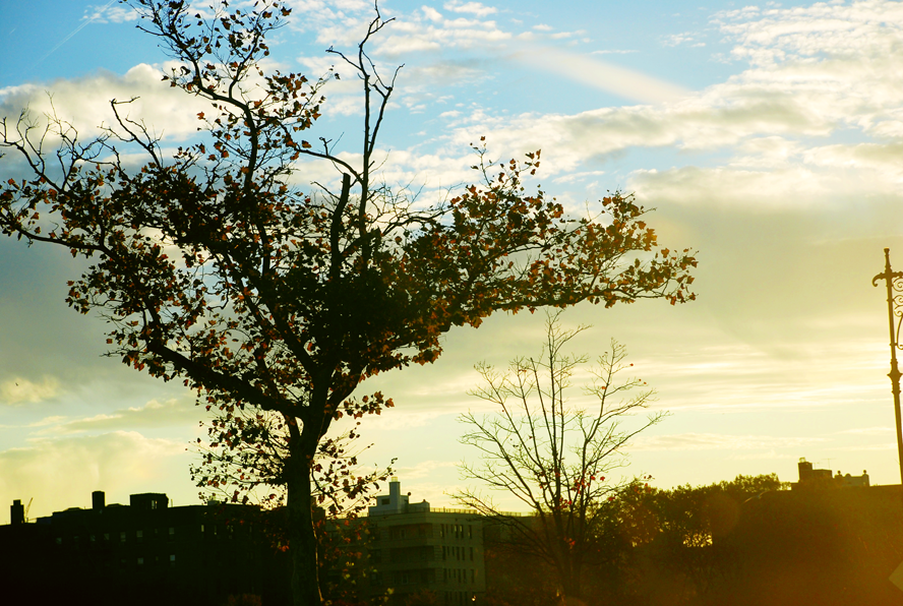|
12/2/2018 Featured Poet: Emily Lake Hansen perfect day dream CC Still Life Morning and the clocks have changed and our sons talk apocalyptic - which way would you pick to die? The kitchen table invaded by monsters. Things are noisy and it’s still not dawn. Outside birds awake and I try to name them: wren and robin, cardinal and finch, all early morning flit and chatter. I grew up in quieter houses - only the din of tv, the humming Santa Anna, suppers with vegetables steamed of sound. I crunched ice between my teeth instead when I wanted something loud. What I controlled then the same as what I control now - nothing - and we’re late for school as always, my keys rattling in the lock. In the car, there’s an argument: zombies or daggers. I pick falling houses, the wicked witch crushed under the foundation. Inheritance In the new country, my grandmother and her sisters carried their heads like anchors, woven canisters meant for immeasurable grain. One married a different man for every decade of her life. One’s brain got erased by waves. One wore a doll strapped to her chest for years and years like a baby. My grandmother planted flowers instead: zinnias and azaleas, white magnolias snipped from trees. She called them out by color, standing in her nightgown in the daylight, her hands perched like birds on her round hips. She was sturdy in those moments, a fat statue on her Florida porch. But she was no different than the rest of them: crazy women raising crazier daughters, their Ukrainian names dropped at the border. In college, I visited an exhibit on genocide and cried like a baby. Where does crazy come from? For years, my grandmother’s parents grew food they couldn’t eat. Rationing, they called it. Punishment. My mother’s sister beat her when she went crazy. My mother swallowed too many pills when she decided she didn’t want to live. I take Zoloft in the morning. I drink too much beer. At the exhibit there were pictures: bodies and bodies and bodies that couldn’t escape. Air Boss Those weekends you wore a fancy suit, your uniform traded for civilian clothes I didn’t recognize - though you woke early still to polish your shoes as if on instinct. I would get up with you those mornings to sit in the garage as you ironed your jacket, one hand smoothing out the creases, the other smoking cigarette after cigarette in the hazy morning light. Your job - they called you Air Boss as if anyone could control air - was to tell the show planes when and where to land, to communicate through headsets and hand gestures with the pilots up in the air. I thought you were a magician then, orchestrating tricks between layers of atmosphere. But I skipped the last show you directed - by then you’d showed me the den of screens where you watched the blinking curlicues of the planes. I knew then there was no magic to you. The trick was hollow like a log. The weekend of your last show I stayed home alone instead, pacing the empty halls like a bird above its prey, like a rescue plane circling tragedy. Blueprint In my spare time, I make a house of horrors, charge admission, spruce it up with cobwebs, replicate the spider that once bit me on the torso while I used the spare bathroom in the hall. Red lines spread out from the center, symmetrical inversions like a child’s painting of a flower. In the bedrooms, I put in torture chambers, BDSM whips and chains holding missing limbs and fingers. Loudspeakers play the blues, a hall of mirrors nearby to reflect the sadness - circus ones where you always look fat. In the main bath, a mermaid swims in a tank of blood water. In the dining room, there’s nothing but onions and sludge. The coffeemaker in the kitchen is broken - though the red light still turns on to confuse you. Outside, you find yourself naked in front of all your friends. Someone videos you with your tits out and whispers they’re no good anyway. If you try hard enough, it could just be a dream - dead soldiers floating behind the house on hologram horses. There’s a pill you could take to make yourself smaller. The exit is in the corner. On the blueprint, I highlight it in yellow, a point of egress for those who still believe in escape. Cycles At the end of each summer, the myrtles in our yard shed their bark in rough curlicues the way snakes lose their skin upon growing. The ringlets get lost in the moss beneath them, pools of useless tendrils. No one’s ready yet for raking - the leaves are green, the air still incessant and wet - and so for months they sit like lost things waiting for burial. Is August the month for grief? It’s too hot to wear tights with this dress. Our myrtles flower only where sun has touched them directly, the undersides baring no flowers and by September one or two less layers of bark. When I die, I want top shelf liquor. I want French songs. I want someone to call me crazy. When we return home, the shedding is almost complete, the flowers done blooming, the bark disappeared into the ground like wavy lines of yarn in carpet. I still know nothing about plant life, am still confused about things like the life cycles of frogs or how bees take pollen and make honey. When my children ask why the bark peels, when they take the molting skin between their fingers like batons, the only answers I have are ones I make up on the spot.  Emily Lake Hansen is the author of the chapbook The Way the Body Had to Travel (dancing girl press). A 2018 Best of the Net Nominee, her poetry has appeared in Nightjar Review, Atticus Review, Stirring, 8 Poems, and SWIMM Every Day among others. When she's not writing, you can find her in Atlanta playing entirely too many children's board games. Comments are closed.
|
AuthorWrite something about yourself. No need to be fancy, just an overview. Archives
April 2024
Categories |

 RSS Feed
RSS Feed
